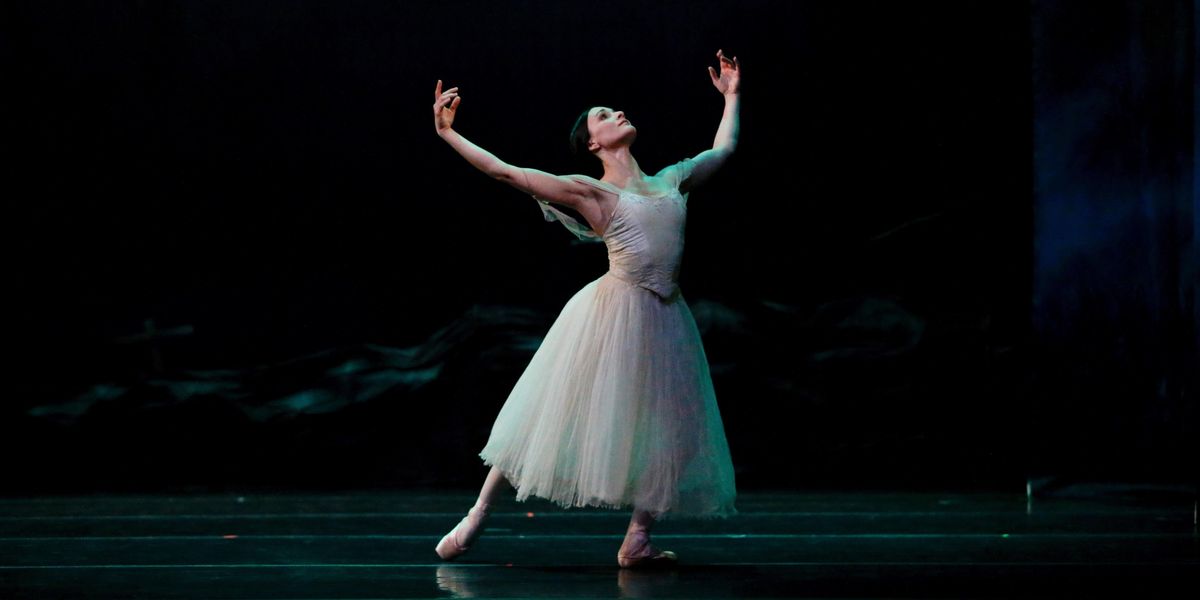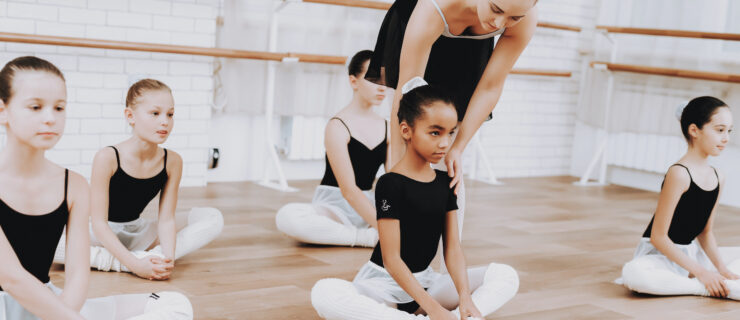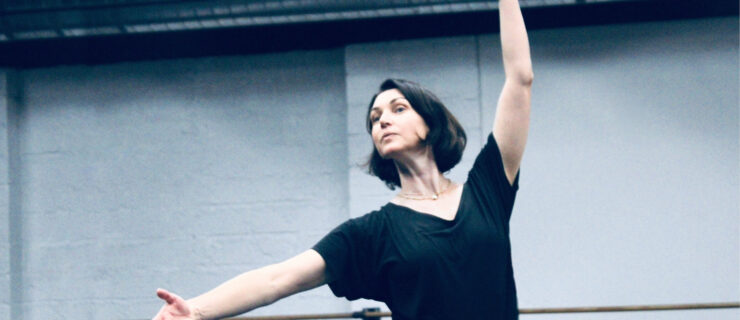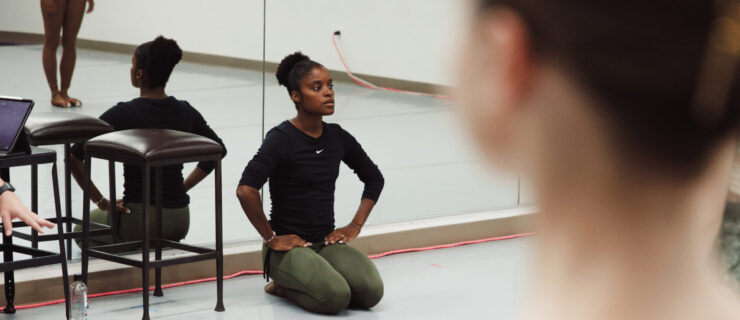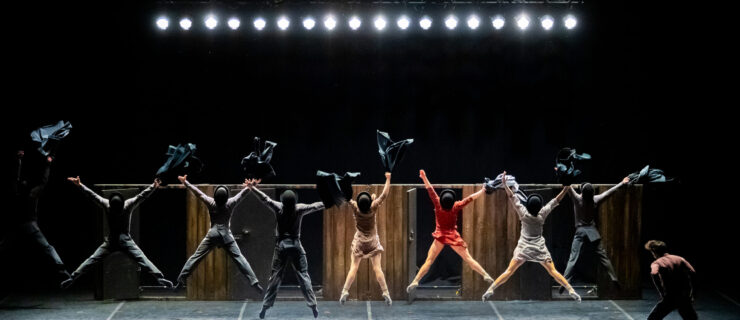Sarah Lane Opens Up About Her Career, Leaving ABT and Her Hopes for the Future
The last year has been one of change for former American Ballet Theatre principal Sarah Lane. Not only has she seen her career interrupted by the pandemic, she has also had to adjust to life without ABT, the company she danced with for 18 years, her last three as a principal.
Lane and ABT parted ways last summer, although no announcement was made; rather, in September, her name was quietly taken off the roster. It left many confused and bereft—she had developed a devoted fan base, with radiant performances in Manon and other full-lengths during the 2019 season at the Metropolitan Opera House.
Almost a year later, Lane is teaching, performing as a guest artist and working towards a college degree (she hopes to become a dietitian post-ballet). She recently opened up to Pointe about her departure from the company, although for privacy reasons certain details are remaining undisclosed. (A spokesperson for ABT said the company cannot comment on personnel matters.) But she also wanted to talk about her overall career and her struggles with perfectionism and performance anxiety, in hopes that her experience might be helpful for other dancers. Below is our conversation.
How did you get into ABT?
I had auditioned for ABT my senior year but didn’t get a contract because I was considered too tiny. Later in the year, at Youth America Grand Prix, I was performing and my music stopped at the beginning of my variation. I thought it would come back on, and so I kept singing it in my head. I was in another world. Suddenly I finished and realized I’d done the whole variation in complete silence. [Artistic director] Kevin McKenzie was there, and afterwards ABT offered me a Studio Company contract. That’s something for young dancers to remember—that when something seems super-disastrous, try to maintain who you are as an artist and human being and keep going.
What was it like during those early years?
The initial transition was stressful. My parents didn’t make a lot of money—during high school in Rochester, New York, I’d had to work part-time selling telescopes at the Discovery Channel store—so I knew that I had to save every penny. Then when I became an apprentice, I wasn’t dancing much. I think a lot of dancers struggle with that, because you go from training really intensely to understudying in the back. I had to be patient, learn from the dancers around me and work harder.
Around this time, I started struggling with disordered eating. Disordered eating is comorbid, meaning it doesn’t stand alone. There are issues in life that go along with it, and for me it was the stress of joining such a big company and feeling insecure. I didn’t want to let anyone down, so I became very perfectionistic and overly careful about what I ate. Then ABT said I needed to gain weight, and I was afraid to. I didn’t have any resources to pay for a nutritionist. It wasn’t until I met my husband’s mom from Madrid, who started cooking for me and taught me what a real meal is—whole foods, prepared with love—that I started to lose my fear of eating. I developed an appreciation and curiosity about food and was able to find more balance.
Can you talk about your first big break with the company? You were so young!
When I was a first-year corps member, I got thrown into the principal role of Theme and Variations. But I felt guilty having that opportunity over more senior dancers! I remember writing a long letter to the whole corps de ballet before the show, saying how much I respected them.
During this time, whenever I was given larger roles, I refused to pull out of the smaller ones, mainly because of my respect for the senior corps members. I felt uncomfortable being cast over others, so I really killed myself trying to do everything from corps to soloist and principal roles, all at one time. I never had a show off. I loved that, though, because I was young and energetic, even if at times I felt exhausted.
Did you feel more secure once you became a soloist two years later?
I can’t say I ever felt very secure, even after 18 years. I idolized ABT so much that I felt like I had a responsibility to be the best dancer I could be. It didn’t come naturally; I had to work for it. I met my husband, [ABT corps member] Luis Ribagorda, my first or second year in the corps, and that was a healthy distraction. I was such a workhorse that I don’t think I allowed myself to be truly happy until I met him.
That said, I’ve always been very consistent about the way I work, and I would encourage young dancers to be consistent with their training. I’m always in class, and I think it’s kept me from injury. During the summers, I’d take no more than a week off. Even in the mountains in Spain with Luis’ family, I would give myself class in the basement.
Did the company notice how hard you were working?
Yes. I also think they took advantage of it, though. I didn’t like pulling out of shows no matter how exhausted or in pain I was, or how many people I was filling in for. They knew that I would always say yes.
Also, I think because of my work ethic and because I was the smallest dancer, I was often put with inexperienced partners. I struggled with this as time went on, because as you mature artistically you want to find more freedom and depth in your dancing. If you’re dancing with someone who is not experienced, or not committed, you can’t be fully free onstage. It would make me very nervous before performances.
You’ve spoken before about struggling with performance anxiety.
Yes. A lot of that also came from comments made to me over the years. One was during a period when ABT started bringing in guest artists. I wasn’t cast as Aurora, even though I had already performed the role before. I was told I hadn’t been ready for it, that I looked frozen. I really took feedback like this to heart; I didn’t have the confidence to consider that maybe Kevin had to justify giving the role to a guest artist.
My nerves also came from being too much of a perfectionist, from caring too much. I remember [ballet master] Keith Roberts came up to me before a performance and simply said, “You’re beautiful.” It meant so much to hear some encouragement. Dancers need that, because we’re high-level athletes and the mind plays a huge role.
Most times I got onstage, though, I was able to get lost in the steps, the characters and the music. Ballet has always taken me to another world artistically and spiritually. I’d remind myself that dancing can be a form of worship, and that I go out there to glorify a God that is so much greater than me, ballet and any critical eye. And gratitude for the opportunity to do what I love relieved my anxiety.
 Courtesy Sarah Lane
Courtesy Sarah Lane
ABT brought in principal guest artists for a number of years. Was that hard for you, as a soloist?
Yes. I think the overuse of them held back talented company dancers. I was actually offered a principal contract with San Francisco Ballet at the time, but I turned it down because I didn’t want to do long distance with my husband.
What helped was to find support from the outside, like my teacher from back home, Fiona Fairrie, and working with different coaches. One of them was Amanda McKerrow. She’s the first ballerina that I ever saw in an ABT full-length, Giselle at the Met. Offstage she’s incredibly humble, and in rehearsals she brings so much positivity and light. And I don’t know what I would have done without Irina Kolpakova; she was the embodiment of love and light to me.
Other ways I inspired myself were through freelance performances and galas. I could learn from other artists and do rep that I wouldn’t necessarily do otherwise, and that helped me grow. I learned from certain guest artists at ABT, as well. You have to keep growing if you want to serve the art.
Did things get better once you became a principal in 2017?
I felt like I could talk to Kevin more easily. But it didn’t last long. After being a soloist for 10 years, I was suddenly doing new roles like Kitri and Nikiya without onstage, full-company rehearsals—and only one show of each, so one shot to get it right. Manon was the same—my partner was injured for the first five weeks of the 2019 Met season and came back the week before our premiere. He was struggling to get through rehearsals, and then we didn’t get any stage rehearsals for the first two acts. I wish I could’ve been able to give more. Although I am really thankful to have had the opportunity to do Manon, because I love the character.
It’s difficult at ABT because there are so many casts, but only so many rehearsals. I think a lot of times they thought, Sarah’s used to being thrown out there; she can do it.
What were the circumstances that led you to leave ABT?
After the 2019 season ended, for the first time in my career I asked Kevin very respectfully to not pair me with one particular partner ever again. He was consistently injured and calling out of rehearsals, and never in class. It made it hard for me to perform my best.
Soon afterwards, my casting changed—I only had three shows for the following Met season. Kevin had been happy with my performances initially, but shortly after I made this request he backtracked and said that my partner gave an amazing show and I didn’t. I felt disposable, like as a woman I had no voice. But I knew in my heart that I had done the best season that I could do.
Why wasn’t there an announcement about your departure?
Initially I asked them not to make one, because I was trying to find a new home. Then I tried to file a formal complaint, because I felt I was being punished for speaking up. In the process, they asked me to not say anything and offered me a final performance of Romeo and Juliet (in 2022), which also would have been my premiere. I would have loved to do that—it’s the ballet I’ve dreamed of my whole life. But I feel like, as an artist, it’s important to be honest and keep my own voice rather than keep quiet and do this performance.
What has been the hardest part about leaving ABT?
The hardest is the situation with COVID and the fact that everything has been closed down. But also not being able to say goodbye to the audience, the Met stage and my colleagues. But, ultimately, real life goes on, and there are more struggles than what I am going through in my ballet career. There’s always something more, something bigger than me.
Would you like to once again dance with a company?
Yes. I don’t like the idea of freelancing, because I like to learn from my colleagues and I like to help them. I would love to find a company that works for me and fits my needs. I love the classical ballets and don’t want to leave them behind. But I appreciate contemporary stuff, too. I recently worked with Sam Pott, the director of Nimbus Dance Works in Jersey City, New Jersey. He choreographed a contemporary solo for me, and I really enjoyed the process. I appreciated that the people at Nimbus and New Jersey Ballet were so welcoming and opened their studios to me when I had nowhere to go.
What would you like young, aspiring dancers to know?
Don’t lose who you are, because this career is so subjective. People can tell you one thing and you can take it to heart and it can discourage you. But don’t let it; just keep persevering. Acknowledge your strengths, and look at your weaknesses productively. Surround yourself with people who support you and genuinely want to help you.
And also, don’t be afraid to stand up for yourself in a respectful, matter-of-fact way. I think that’s difficult for young dancers. That was my problem—I would get emotional because I didn’t know how to express myself and felt guilty saying I was having difficulties with something. You have to pick your battles, but there’s a way to do it, and that’s something you learn as you grow. At the end of the day, when your ballet career is over, it’s about who you are as a person, not the roles you danced. Your identity is so much more than ballet.
